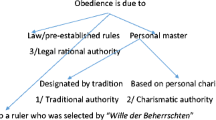Abstract
Every state, Trotsky is said to have remarked at Brest-Litovsk, is based on violence. His contemporary Max Weber agreed with this, but added a crucial qualification. If a state is to survive, those who are ruled must acquiesce in its claims to authority. State authority, like authority in general, is based on internal justifications, and it can be maintained only as long as these are accepted (PS: 506ff.).
Access this chapter
Tax calculation will be finalised at checkout
Purchases are for personal use only
Preview
Unable to display preview. Download preview PDF.
Similar content being viewed by others
References
Bendix, Reinhard. 1974. Work and Authority in Industry, 2nd edn. Berkeley: University of California Press.
Borcke, Astrid von 1977. Die Ursprünge des Bolschewismus. Die jakobinische Tradition in Russland und die Theorie der revolutionären Diktatur. München: Berchmann.
Brügmann, Uwe. 1973. Die russischen Gewerkschaften in Revolution und Bürgerkrieg, 1917–1919. Wien: Europäische Verlagsanstalt.
Carrère d’Encausse, Helène. 1980. Le pouvoir confisqué. Gouvernants et gouvernés en U.R.S.S. Paris: Flammarion.
Chotiner, Barbara. 1984. Khrushchev’s Party Reform. Coalition Building and Institutional Innovation. Westport: Greenwood Press.
Cohen, Stephen. 1980. Bukharin and the Bolshevik Revolution. A Political Biography 1888–1938. Oxford: Oxford University Press.
Critchlow, James. 1988. ‘Corruption, Nationalism, and the Native Elites in Soviet Central Asia’. Journal of Communist Studies 4(2), pp. 142–61.
Erickson, John. 1968. The Origins of the Red Army’ in Richard Pipes, ed., Revolutionary Russia. Cambridge, Mass.: Harvard University Press, pp. 224–58.
Ferro, Marc. 1980. The Bolshevik Revolution. A Social History of the Russian Revolution. London: Routledge and Kegan Paul.
Fischer, Louis. 1970. Das Leben Lenins. 2 vols, München: Deutscher Taschenbuchverlag.
Fitzpatrick, Sheila. 1979. Education and Social Mobility in the Soviet Union, 1921–1934. Cambridge: Cambridge University Press.
Getty, J. Arch. 1985. Origins of the Great Purges. The Soviet Communist Party Reconsidered, 1933–1938. Cambridge: Cambridge University Press.
Hildermeier, Manfred. 1989. Die russische Revolution 1905–1921. Frankfurt: Suhrkamp.
Hough, Jerry. 1980. Soviet Leadership in Transition. Washington DC: Brookings Institute.
Hunt, Lynn. 1984. Politics, Culture and Class in the French Revolution. Berkeley: University of California Press.
Jowitt, Kenneth. 1978. The Leninist Response to National Dependency. Berkeley: University of California Press.
Jowitt, Kenneth. 1983. ‘Soviet Neotraditionalism: The Political Corruption of a Leninist Regime’. Soviet Studies 35(3), pp. 275–97.
Keep, John. 1976. The Russian Revolution: A Study in Mass Mobilization. New York: Norton.
Leggett, George. 1986. The Cheka: Lenin’s Political Police, 2nd edn. Oxford: Oxford University Press.
Lenin, Wladimir. Werke. 40 vols., Berlin: Dietz.
Lewytzkyi, Boris. 1967. Die Kommunistische Partei der Sowjetunion. Porträt eines Ordens. Stuttgart: Klett.
Lorenz, Richard. 1976. Sozialgeschichte der Sowjetunion, vol. 1: 1917–1945. Frankfurt: Suhrkamp.
Mommsen, Wolfgang. 1974. The Age of Bureaucracy. Oxford: Blackwell.
Murvar, Vatro. 1984. ‘Max Weber and the Two Nonrevolutionary Events in Russia 1917: Scientific Achievements or Prophetic Failures’ in Ronald Glassman and Vatro Murvar, eds, Max Weber’s Political Sociology: A Pessimistic Vision of a Rationalized World. Westport: Greenwood Press, pp. 237–72.
Nienhaus, Ursula. 1980. Revolution und Bürokratie: Staatsverwaltung und Staatskontrolle in Sowjetrussland 1917–1924. Frankfurt: R. G. Fischer.
Nyomarkay, Joseph. 1967. Charisma and Factionalism in the Nazi Party. Minneapolis: University of Minnesota Press.
Pethybridge, Roger. 1974. The Social Prelude to Stalinism. New York: Norton.
Pomper, Philip. 1990. Lenin, Trotsky, and Stalin. The Intelligentsia and Power. New York: Columbia University Press.
Rabinowitch, Alexander. 1976. The Bolsheviks Come to Power. The Revolution of 1917 in Petrograd. New York: Norton.
Riegel, Klaus-Georg. 1985. Konfessionsrituale im Marxismus-Leninismus. Graz: Styria.
Riegel, Klaus-Georg. 1987. ‘Sendungsprophetie und Charisma. Am Beispiel Leo Trotzkis’ in Wolfgang Lipp, ed. Kulturtypen, Kulturcharaktere. Berlin: Reimer, pp. 221–37.
Rigby, Thomas. 1979. Lenin’s Government: Sovnarkom 1917–1922. Cambridge: Cambridge University Press.
Rigby, Thomas. 1980. ‘A Conceptual Approach to Authority, Power and Policy in the Soviet Union’ in Thomas Rigby, Archie Brown and Peter Reddaway, eds. Authority, Power and Policy in the USSR. London: Macmillan, pp. 9–31.
Roth, Günther. 1987. Politische Herrschaft und persönliche Freiheit. Frankfurt: Suhrkamp.
Rowney, Don. 1989. Transition to Technocracy. The Structural Origins of the Soviet Administrative State. Ithaca: Cornell University Press.
Schluchter, Wolfgang. 1979. Die Entwicklung des okzidentalen Rationalismus. Tübingen: J.C.B.Mohr.
Schmitt, Carl. 1978. Die Diktatur, 4th edn. Berlin: Duncker & Humblot.
Schweitzer, Arthur. 1984. The Age of Charisma. Chicago: Nelson-Hall.
Service, Robert. 1979. The Bolshevik Party in Revolution. A Study in Organisational Change 1917–1923. London: Macmillan.
Service, Robert. 1985. Lenin: A Political Life, vol. 1. London: Macmillan.
Sternheimer, Stephen. 1980. ‘Administration for Development: The Emerging Bureaucratic Elite, 1920–1930’ in Walter M. Pintner and Don Rowney, eds, Russian Officialdom. Chapel Hill: University of North Carolina Press, pp. 316–54.
Süss, Walter. 1982. ‘Partei, Bürokratie und Arbeiterklasse auf dem Weg in den Stalinismus’ in Gernot Erler and Walter Süss, eds, Stalinismus. Probleme der Sowjetgesellschaft zwischen Kollektivierung und Weltkrieg. Frankfurt/New York: Campus, pp. 603–57.
Tucker, Robert. 1968. ‘The Theory of Charismatic Leadership’. Daedalus 97(3), pp. 731–56.
Tyrell, Hartmann. 1981. ‘Ist der Webersche Bürokratietypus ein objektiver Richtigkeitstypus? Anmerkungen zu einer These von Renate Mayntz’. Zeitschrift für Soziologie. 10, pp. 38–49.
Wade, Rex. 1984. Red Guards and Worker’s Militias in the Russian Revolution. Stanford: Stanford University Press.
Williams, Robert. 1986. The Other Bolsheviks. Lenin and His Critics. 1904–1914. Bloomington: Indiana University Press.
Editor information
Editors and Affiliations
Copyright information
© 1998 Palgrave Macmillan, a division of Macmillan Publishers Limited
About this chapter
Cite this chapter
Breuer, S. (1998). Soviet Communism and Weberian Sociology. In: Schroeder, R. (eds) Max Weber, Democracy and Modernization. Palgrave Macmillan, London. https://doi.org/10.1007/978-1-349-26836-8_10
Download citation
DOI: https://doi.org/10.1007/978-1-349-26836-8_10
Publisher Name: Palgrave Macmillan, London
Print ISBN: 978-0-333-71254-2
Online ISBN: 978-1-349-26836-8
eBook Packages: Palgrave Social & Cultural Studies CollectionSocial Sciences (R0)




